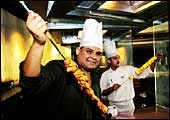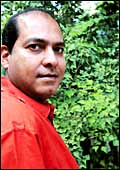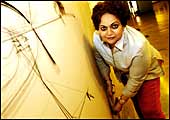 |
 |
|
Food for thought: Dilip Joshi (L),
whose clients include Lush and RA Lounge, and Marut Sikka
of Amaya
|
Take
passion. Cardio-throb loads of it. Combine it with an abiding-nay,
gnawing-hunger for knowledge. And you have the base for a career
as a food consultant. Not to mention possible celebrityhood. "With
restaurant launches becoming a television event," says Rashmi
Uday Singh, who prefers to be called a food writer, "food
consultants are finding their place in the sun."
So, what's a food consultant?
Not chef, not restaurateur, nor just food
connoisseur, nor even food researcher. A food consultant is a
walking gastro-paedia with a good grasp of what would tingle whose
palate and make whom drool. A good enough grasp, really, to be
sought out by anyone trying to open a new restaurant or revive
an old one.
The Right To Eat Out
Big City India seems to have broken out with
a rash, and it's restaurants. They're popping up almost everywhere,
some emerging overnight, others vanishing only to be replaced
by others still. "It's a bug in the blood," laughs Marut
Sikka, food consultant to restaurateur Camellia Panjabi's Amaya.
According to the Federation of Hotel and Restaurant Associations
of India (FHRAI), the country has about two million restaurants.
Rough estimates suggest that some 2,000 new ones started wooing
taste buds last year in the big cities alone, and this year could
have even more, especially if the Sensex heads towards the 7,000
level again. Even cricketers and film stars want to open dining
joints these days, and the fear of failure isn't going to cow
their ambitions down.
As Sir Terrence Conran,
the globally admired drool druid and creator of Paris' famous
L'Alcazar, once put it: "The feeling after a good meal is
so strong that 97 per cent of people want to open a restaurant."
Eating out, it seems, is not just fashionable, it's also a primal
need of sorts. Driven by animal spirits.
Food consultancy is not for hobbyists, though.
It takes plenty of research, according to Jiggs Kalra, who shot
into fame for doing the menu for Prince Charles and Princess Diana's
visit to India, but is otherwise known for reviving such delicacies
as Lucknow's Tunda Kebab. The man has been digging up recipes
for 40 years. "I hunt in libraries for manuscripts and get
them translated," reveals Kalra. He uses the description
of a "music maestro conducting a chef" for the job,
and hails Roland Fuchs, the brains of the Gharana at Kolkata's
Grand, as a true master of the art. Kalra's own favourite job?
The Kandahar at Oberoi Mumbai.
| A food consultant has a good grasp of what
would tingle whose palate and what makes whom drool |
Secrets Of The Script
Food consultants of repute
can earn Rs 5-15 lakh for a project, depending on negotiation
skills and the restaurant budget (getting a 10th of the budget
is good going). Consultancy reputations are created mostly via
word of mouth, helped along by a resume of projects that got customers
knocking down the doors.
Yet, Sikka, a Kalra protégé,
is convinced that for all the experience, ideas and systems that
a food consultant brings to the table, it is essentially a restaurateur's
business, and it is the personal passion on the latter's part
that makes or breaks a restaurant. That's why some consultants
prefer to go beyond words of advice. Culinary expert Karen Anand,
for example, insists that a food consultant must be able to cook.
Her roster includes Mumbai's Khyber, Chennai's Citrus and Pune's
Chateau Indage as restaurants, apart from several recipes for
companies such as ITC, Britannia and Domino's. "When I consult,
I train the chefs as well," says she, glad to put her global
exposure to good use. "I befriended chefs in France and Spain,"
she recounts, in elaboration, "and would learn in their kitchens."
 |
 |
|
Culinary connoisseurs: Karan Anand
(L) trains chefs apart from consulting, while Ajit Saldanha
believes in demystifying food
|
|
FAQs
What does it pay?
Rs 5-15 lakh per project
Qualifications needed?
Experience of varied food and tastes
Any training courses?
None yet
How is success marked?
Word of mouth and repeat business
|
That's a privilege, since good food is a business
of closely guarded secrets. Nobody has been able to replicate
Delhi-based Karim's formula for enriched Mughlai food, gorging
on which does not enervate but energise. "Chefs are jealous
and protective about their recipes," says Ajit Saldanha,
a Bangalore-based food consultant. He feels that "consultants
are needed to demystify food" for business. In his view,
though, consultants should go for variable compensation-a fraction
of the money made. "The ability to back your ideas is real
success and confidence," says Saldanha. He regards Rick Stein,
the man who introduced Nouvelle Cuisine to New York, as his guru,
and after consulting for Ebony and Samarkand in Bangalore, is
agog with a new concept restaurant that will serve cuisines from
geographies that trace Alexander's footsteps.
Food secrets, of course, can come from just
about anywhere, the more unique the better. Drool druid Dilip
Joshi trained under an English butcher in Bahrain a quarter of
a century ago, and returned to Mumbai to start Shawns, before
blending all his learnings to start a catering service that caters
to high-profile corporate clients and fancy clubs like Athena.
His notable restaurant jobs include Mumbai's Lush and ra Lounge.
And to Joshi, success is not just about culinary knowledge. But
rather, about the pulse of the city-in all its tongue-curling
intimacy. "It's all about being streetsmart," he feels.
About "keeping your eyes and ears open".
SPOTLIGHT
Physiotherapists
 |
|
ISIC's Kataria: Soft touch
|
Recovery
from injury often takes a helping hand-specifically, the trained
touch of a physiotherapist.it's a fulfilling job, notes Dr. Chitra
Kataria, Head (Rehabilitation Department), Indian Spinal Injuries
Centre, New Delhi. "Dedication, humility and politeness are the
key attributes needed in a patient-therapist relationship," she
says, "for, physiotherapy is not an overnight treatment, but a
long-term one." You play both Watson and Crick. It involves both
medical and motivational skills, not to mention plenty of patience
with such poorly understood afflictions as post-traumatic stress
disorder. A physio grad can earn around Rs 9,000-10,000 per month,
"but there are better job opportunities after a Master's degree".
India currently has under 5,000 postgraduate physiotherapists,
while top-end demand is placed at twice that figure.
-Payal Sethi
COUNSELLING
Help, Tarun!
 I am a 30-year-old software professional with nine years work
experience at a US-based IT MNC in a lead position. I am considering
one-year duration MBA programmes aimed at working professionals,
to enhance career growth prospects. However, I need advice on
placements (if I quit my current employer for an MBA). Do companies
recruiting on campus prefer less experienced people? Will my chances
of getting a good placement in line with my profile reduce if
I pursue an MBA programme?
I am a 30-year-old software professional with nine years work
experience at a US-based IT MNC in a lead position. I am considering
one-year duration MBA programmes aimed at working professionals,
to enhance career growth prospects. However, I need advice on
placements (if I quit my current employer for an MBA). Do companies
recruiting on campus prefer less experienced people? Will my chances
of getting a good placement in line with my profile reduce if
I pursue an MBA programme?
First of all, your fears are unfounded. To pursue an MBA with
your experience is a great move indeed. Since you are planning
to do a one-year MBA course, your absence from your field of activity
will not be too long. You will easily be able to go back to what
you were doing, and with a better qualification and enhanced chances
of growth. As for campus placement for experienced persons embarking
on an MBA, there are ample opportunities to do reasonably well.
If you do find yourself limited by campus placement, you can always
look for placement independently.
I am a final year MBA student pursuing
my degree from a reputed institute in Lucknow. Our institute provides
good placement opportunities and this year we had several MNCs
scouting for talent. Unfortunately, I could not get a job in any
one of them as the group discussion proved to be my nemesis. Till
now, I've not been able to clear a single group discussion despite
clearing all other tests. Please advise me on how I can overcome
this problem.
It is difficult for me to counsel you with
a short answer. However, let me give you a few quick pointers
that have helped me. Everyone gets nervous-the professionals only
get over their nervousness! So don't fret, you are not alone.
Always try and know your subject. Reading and keeping yourself
informed will strengthen your confidence and give you material
to talk about. Often we think what we have to contribute, but
are afraid we'd look silly. But do talk in any case. Also, practice
is a great confidence booster. You can prepare a list of FAQs
and practice answers for it. Having someone subject you to a mock
interview and give you feedback is also not a bad idea.
I am a 24-year-old electronics graduate.
I got an offer from a top German MNC in 2001, but due to the slowdown
they could not confirm my appointment. So I took up MBA (marketing)
at a top Indian B-school. I am currently working as a sales executive
in a top Indian IT hardware firm, but there is no scope for creativity
here and the pay is poor. I am considering options like an MS
or PhD. But how will an industry view a BE, MBA and MS who has
only a year's experience in business development and no technical
experience?
You are only 24-so you do have the luxury
of being able to spend a couple of years studying. The industry
will view a be, MS, MBA pretty favourably as these qualifications
are thought to be complementary and compatible. However, when
you finish your education and look for job opportunities, make
sure you concentrate on those companies that match your personality
and technical aspirations. It might happen that due to your MBA,
you may be seen as a potential candidate in areas like sales and
marketing, which will involve interaction rather than just technical
skills.
I am a BE (mechanical) currently employed
with a small but promising company in Pune with a pay packet less
than Rs 1 lakh per annum. As a beginner, I am quite satisfied
with my job but the problem lies with my family members, who insist
that I either acquire an MBA degree or shift my focus to IT software.
They feel the company I am working for is a small-time one and
the pay is low compared to that for an MBA or software engineer.
Are they thinking right?
Well, on one hand we have the Infosyses and
Apple Computers of the world, which started in garages and basements.
Those who have stuck with them have made it big! On the other
hand, all companies that have started small have not become behemoths.
You need to carefully evaluate what the future holds for the company
as well as yourself in it. As for your family members, they are
only trying to be practical and protect your future. If you have
faith in the company, and its future, you can decide to work for
it. However, an MBA degree is a good qualification to have in
any industry, and to secure your future in case your company doesn't
live up to expectations, you could certainly try for it.
Answers to your career concerns are contributed
by Tarun Sheth (Senior Consultant) and Shilpa Sheth (Managing
Partner, US practice) of HR firm, Shilputsi Consultants. Write to
Help,Tarun! c/o Business Today, Videocon Tower, Fifth Floor, E-1,
Jhandewalan Extn., New Delhi-110055..
For
That Gush Rush
How about oil exploration
as a career option?
 |
| Oiling up: Good pay and
a fair choice of employers too |
The
world's 'rig count'-an enumeration of oil exploration installations-has
been on the incline, and job prospects for exploration professionals
remain buoyant. According to Vinod Pillai, Head (HR), Aban Lloyd,
"The interest among graduate engineers for this sector has
been rising, for this pays more to beginners than other streams
do." The oil sector commands special attention at several
Indian engineering institutes, and expertise is needed not just
in basic drilling, but even a specialised variety of electrical,
mechanical and marine disciplines. After all, even sound waves
come in use on an oil mission.
India has over 100 oil rigs in use currently,
twice the figure just two years ago, employing an average of 100
experienced professionals each. Private sector exploration has
only added to the buzz. "Experience in the sector,"
says Pillai "is very crucial, and so retaining the people
is a bigger challenge as a lot of outflow of employees happens
to foreign countries." A trainee engineer in India can expect
over Rs 20,000 per month, with a fair choice of employers too.
Overseas prospects, of course, are brighter still.
-Supriya Shrinate
Refinement
Margins
Art curators do a
rare but rewarding job.
 |
| Artscape: All about sophisticated
sense and sensibilities |
The
'gentleman's profession' has thrown itself open to anybody wanting
a crack at being an art curator. Anybody, that is, who can refine
his or her sensibilities to that rarefied space that's inhabited
only by those who truly 'get it'. The job is rewarding, art-wise;
bridging artists and appreciators is stimulation in itself. "Art
curating is interesting, but can be exhaustive too," says
Alka Pande, curator of Delhi-based Visual Arts Gallery. "Decisions
for the shows-number of displays, which galleries to be used-and
many other procedural issues are all responsibilities of the curator,"
she adds. It takes a sophisticated 'market sense' of how to engage
people's minds. "Just like artists, curators are self-taught,"
says Aman Nath, hotelier and art advisor, "it's the right
aptitude, awareness and creativity that count."
And the financial rewards? Possibly above
Rs 25,000 per project. How would you become a curator? Pande's
advice: "Get apprenticeship under a renowned curator and
always keep your eyes and ears open to what's happening around
you."
-Indrani Rajkhowa
|









 I am a 30-year-old software professional with nine years work
experience at a US-based IT MNC in a lead position. I am considering
one-year duration MBA programmes aimed at working professionals,
to enhance career growth prospects. However, I need advice on
placements (if I quit my current employer for an MBA). Do companies
recruiting on campus prefer less experienced people? Will my chances
of getting a good placement in line with my profile reduce if
I pursue an MBA programme?
I am a 30-year-old software professional with nine years work
experience at a US-based IT MNC in a lead position. I am considering
one-year duration MBA programmes aimed at working professionals,
to enhance career growth prospects. However, I need advice on
placements (if I quit my current employer for an MBA). Do companies
recruiting on campus prefer less experienced people? Will my chances
of getting a good placement in line with my profile reduce if
I pursue an MBA programme? 
